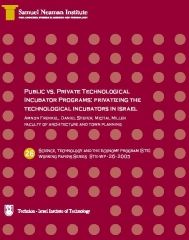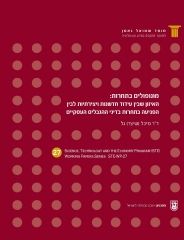Report PRIME ENIP Project Indices Data Scienc Technology Israel
This report was published as part of the project “European Network for Indicator Producers, PRIME-ENIP”. Its purpose is to establish a network of indicator producers in the fields of science and technology, based on the experience of recognized institutions, laboratories, research groups and indicator producers, in order to develop the ability and knowledge of providing […]
What Affects Technion Faculty Members’ Decision to Found a Start-Up Firm? Effects of the Business Opportunity and the Entrepreneur’s (faculty)
While research has recognized the importance of the entrepreneurial opportunity evaluation (EOE) stage in affecting overall entrepreneurship activity, only venture capitalists (VCs) perspectives were explored. No research has attempted to understand the crucial and complementary role of entrepreneurs points of view. In an effort to fill this gap, the current study focuses on the entrepreneur […]
השקעות במו”פ אזרחי, הון אנושי ותפוקה מדעית-טכנולוגית של מו”פ בישראל: נתונים כבסיס לדיון לגיבוש מדיניות לאומית
Science and Technology Indicators in Israel: An International Comparison

It is well recognized that human capital, especially in the areas of science and technology, (S&T), is the main growth-enabling resource in Israel. How can this recognition be evaluated in light of the economic and statistical data over time? In this new Neaman Institute study we propose a systematic set of indicators, which can and […]
From Ivory Tower to Industrial Promotion:The Case of Yale University and the Biotechnology Cluster in New Haven, Connecticut, STE-WP-28
In 2001 Ernst & Young ranked the state of Connecticut seventh in the nation with respect to the number of biotech firms operating within its borders relative to its population (Ernst & Young, 2001). In 1993 there were only six such companies in the state. What led to this increase? This case study describes the […]
Evolutionary Innovation and High Tech Policy: What can we Learn from Israel’s Targeting of Venture Capital STE-WP-25
The paper analyzes Israel’s Innovation and High Tech Policy from a Systems-Evolutionary (S/E) and Life Cycle Perspectives with a focusing on the targeting of the Venture Capital Industry during the 1990s. Other related research strongly suggested that the emergence of Venture Capital (VC) during that decade was a central vector in the re-configuration of Israel’s […]
Public vs. Private Technological Incubator Programs: Privatizing the Technological Incubators in Israel STE-WP-26

The Public Technological Incubator Program (PTIP) was initiated in the early nineties by the Office of the Chief Scientist (OCS) in the Ministry of Industry and Trade in Israel in the wake of a large influx of immigrants from the former USSR, many of whom were scientists and engineers. Since the year 2000, private technological […]
Monopolies in Competition:The Balance between Innovativeness and Competition in the Israeli Competition Law STE-WP-27

Law plays an important role in the formation of incentives for the creation as well as the diffusion of intellectual property. Intellectual property laws and competition law are of special importance. Intellectual property laws determine when an inventor is entitled to receive an exclusive right to use his invention. The grant of such a right […]
The Technological Incubators in Israel: Technological Policy in an Era of Privatization
During the last twenty years there has been a concentrated efforts made by the Israeli government to support and develop the high-tech industry. Among other means, a prominent place is kept for the Technological Incubator Program, which was established in 1991. The technological incubators are supportive frameworks, which help initiators in their first steps to […]
Firm Growth Profiles (FGPs): Towards an Action-Based View of Firm Development STE-WP-24
The paper presents the concept of the Firm Growth Profile (FGP) which contributes to the creation of a dynamic Resource-Based View theory by explaining how capabilities are developed in path-dependent processes. An FGP represents the pattern of critical actions taken by a firm in different value activities (e.g. R&D, marketing, production and finance) during subsequent […]
